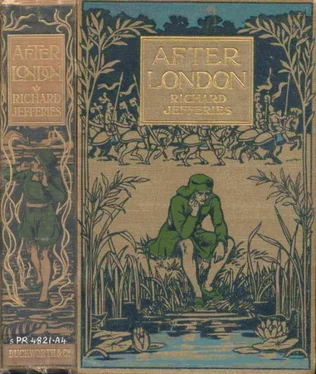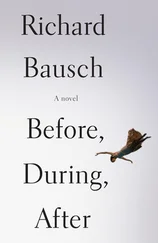Richard Jefferies - After London
Здесь есть возможность читать онлайн «Richard Jefferies - After London» весь текст электронной книги совершенно бесплатно (целиком полную версию без сокращений). В некоторых случаях можно слушать аудио, скачать через торрент в формате fb2 и присутствует краткое содержание. Город: London, Год выпуска: 1905, Издательство: Duckworth & Co., Жанр: sf_postapocalyptic, на английском языке. Описание произведения, (предисловие) а так же отзывы посетителей доступны на портале библиотеки ЛибКат.
- Название:After London
- Автор:
- Издательство:Duckworth & Co.
- Жанр:
- Год:1905
- Город:London
- ISBN:нет данных
- Рейтинг книги:4 / 5. Голосов: 1
-
Избранное:Добавить в избранное
- Отзывы:
-
Ваша оценка:
- 80
- 1
- 2
- 3
- 4
- 5
After London: краткое содержание, описание и аннотация
Предлагаем к чтению аннотацию, описание, краткое содержание или предисловие (зависит от того, что написал сам автор книги «After London»). Если вы не нашли необходимую информацию о книге — напишите в комментариях, мы постараемся отыскать её.
(1885), set in a future in which urban civilization has collapsed after an environmental crisis.” (From
).
This eBook is for the use of anyone anywhere at no cost and with almost no restrictions whatsoever. You may copy it, give it away or re-use it under the terms of the Project Gutenberg License included with this eBook or online at
* * *
After London — читать онлайн бесплатно полную книгу (весь текст) целиком
Ниже представлен текст книги, разбитый по страницам. Система сохранения места последней прочитанной страницы, позволяет с удобством читать онлайн бесплатно книгу «After London», без необходимости каждый раз заново искать на чём Вы остановились. Поставьте закладку, и сможете в любой момент перейти на страницу, на которой закончили чтение.
Интервал:
Закладка:
All was now ready, and Felix was only waiting for the Feast of St. James to pay a last visit to Aurora at Thyma Castle. The morning before the day of the Feast, Felix and Oliver set out together. They had not lived altogether in harmony, but now, at this approaching change, Oliver felt that he must bear Felix company. Oliver rode his beautiful Night, he wore his plumed hat and precious sword, and carried his horseman’s lance. Felix rode a smaller horse, useful, but far from handsome. He carried his yew bow and hunting knife.
Thyma Castle was situated fifteen miles to the south; it was the last outpost of civilization; beyond it there was nothing but forest, and the wild open plains, the home of the gipsies. This circumstance of position had given Baron Thyma, in times past, a certain importance more than was due to the size of his estate or the number of his retainers. During an invasion of the gipsies, his castle bore the brunt of the war, and its gallant defence, indeed, broke their onward progress. So many fell in endeavouring to take it, that the rest were disheartened, and only scattered bands penetrated beyond.
For this service the Baron received the grant of various privileges; he was looked on as a pillar of the State, and was welcome at the court. But it proved an injury to him in the end. His honours, and the high society they led him into, were too great for the comparative smallness of his income. Rich in flocks and herds, he had but little coin. High-spirited, and rather fond of display, he could not hold back; he launched forth, with the usual result of impoverishment, mortgage, and debt.
He had hoped to obtain the command of an army in the wars that broke out from time to time; it was, indeed, universally admitted that he was in every respect qualified for such a post. The courtiers and others, however, jealous, as is ever the case, of ability and real talent, debarred him by their intrigues from attaining his object. Pride prevented him from acquiescing in this defeat; he strove by display and extravagance to keep himself well to the front, flaunting himself before the eyes of all. This course could not last long; he was obliged to retire to his estate, which narrowly escaped forfeiture to his creditors.
So ignominious an end after such worthy service was, however, prevented by the personal interference of the old Prince, who, from his private resources, paid off the most pressing creditors. To the last, the old Prince received him as a friend, and listened to his counsel. Thyma was ever in hopes that some change in the balance of parties would give him his opportunity. When the young Prince succeeded, he was clever enough to see that the presence of such men about his Court gave it a stability, and he, too, invited Thyma to tender his advice. The Baron’s hopes now rose higher than ever, but again he was disappointed.
The new Prince, himself incapable, disliked and distrusted talent. The years passed, and the Baron obtained no appointment. Still he strained his resources to the utmost to visit the Court as often as possible; still he believed that sooner or later a turn of the wheel would elevate him.
There had existed between the houses of Thyma and Aquila the bond of hearth-friendship; the gauntlets, hoofs, and rings were preserved by both, and the usual presents passed thrice a year, at midsummer, Christmas, and Lady-day. Not much personal intercourse had taken place, however, for some years, until Felix was attracted by the beauty of the Lady Aurora. Proud, showy, and pushing, Thyma could not understand the feelings which led his hearth-friend to retire from the arena and busy himself with cherries and water-wheels. On the other hand, Constans rather looked with quiet derision on the ostentation of the other. Thus there was a certain distance, as it were, between them.
Baron Thyma could not, of course, be ignorant of the attachment between his daughter and Felix; yet as much as possible he ignored it. He never referred to Felix; if his name was incidentally mentioned, he remained silent. The truth was, he looked higher for Lady Aurora. He could not in courtesy discourage even in the faintest manner the visits of his friend’s son; the knightly laws of honour would have forbidden so mean a course. Nor would his conscience permit him to do so, remembering the old days when he and the Baron were glad companions together, and how the Baron Aquila was the first to lead troops to his assistance in the gipsy war. Still, he tacitly disapproved; he did not encourage.
Felix felt that he was not altogether welcome; he recognised the sense of restraint that prevailed when he was present. It deeply hurt his pride, and nothing but his love for Aurora could have enabled him to bear up against it. The galling part of it was that he could not in his secret heart condemn the father for evidently desiring a better alliance for his child. This was the strongest of the motives that had determined him to seek the unknown.
If anything, the Baron would have preferred Oliver as a suitor for his daughter; he sympathized with Oliver’s fiery spirit, and admired his feats of strength and dexterity with sword and spear. He had always welcomed Oliver heartily, and paid him every attention. This, to do Oliver justice, was one reason why he determined to accompany his brother, thinking that if he was there he could occupy attention, and thus enable Felix to have more opportunity to speak with Aurora.
The two rode forth from the courtyard early in the morning, and passing through the whole length of the enclosure within the stockade, issued at the South Barrier and almost immediately entered the forest. They rather checked their horses’ haste, fresh as the animals were from the stable, but could not quite control their spirits, for the walk of a horse is even half as fast again while he is full of vigour. The turn of the track soon shut out the stockade; they were alone in the woods.
Long since, early as they were, the sun had dried the dew, for his beams warm the atmosphere quickly as the spring advances towards summer. But it was still fresh and sweet among the trees, and even Felix, though bound on so gloomy an errand, could not choose but feel the joyous influence of the morning. Oliver sang aloud in his rich deep voice, and the thud, thud of the horses’ hoofs kept time to the ballad.
The thrushes flew but a little way back from the path as they passed, and began to sing again directly they were by. The whistling of blackbirds came from afar where there were open glades or a running stream; the notes of the cuckoo became fainter and fainter as they advanced farther from the stockade, for the cuckoo likes the woodlands that immediately border on cultivation. For some miles the track was broad, passing through thickets of thorn and low hawthorn-trees with immense masses of tangled underwood between, brambles and woodbine twisted and matted together, impervious above but hollow beneath; under these they could hear the bush-hens running to and fro and scratching at the dead leaves which strewed the ground. Sounds of clucking deeper in betrayed the situation of their nests.
Rushes, and the dead sedges of last year, up through which the green fresh leaves were thrusting themselves, in some places stood beside the way, fringing the thorns where the hollow ground often held the water from rainstorms. Out from these bushes a rabbit occasionally started and bounded across to the other side. Here, where there were so few trees, and the forest chiefly consisted of bush, they could see some distance on either hand, and also a wide breadth of the sky. After a time the thorn bushes were succeeded by ash wood, where the trees stood closer to the path, contracting the view; it was moister here, the hoofs cut into the grass, which was coarse and rank. The trees growing so close together destroyed themselves, their lower branches rubbed together and were killed, so that in many spots the riders could see a long way between the trunks.
Читать дальшеИнтервал:
Закладка:
Похожие книги на «After London»
Представляем Вашему вниманию похожие книги на «After London» списком для выбора. Мы отобрали схожую по названию и смыслу литературу в надежде предоставить читателям больше вариантов отыскать новые, интересные, ещё непрочитанные произведения.
Обсуждение, отзывы о книге «After London» и просто собственные мнения читателей. Оставьте ваши комментарии, напишите, что Вы думаете о произведении, его смысле или главных героях. Укажите что конкретно понравилось, а что нет, и почему Вы так считаете.












